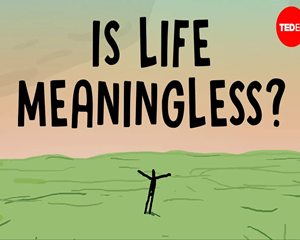(单词翻译:单击)
Albert Camus grew up surrounded by violence. His homeland of Algeria was mired in conflict between native Algerians and colonizing French Europeans.
阿尔贝·加缪在暴力的环境中成长。他的家乡阿尔及利亚深陷于当地阿尔及利亚人与法国欧洲殖民者之间的冲突之中。
He lost his father in the First World War, and was deemed unfit to fight in the second.
他在第一次世界大战中失去了父亲,第二次世界大战时,被认定不适合参加战斗。
Battling tuberculosis in France and confronting the war's devastation as a resistance journalist, Camus grew despondent.
他在法国与结核病抗争,并以抵抗组织记者的身份直面战争的破坏,这些经历让加缪变得沮丧。
He couldn't fathom any meaning behind all this endless bloodshed and suffering.
他无法在这些无止境的杀戮与痛苦背后找到任何意义。
He asked: if the world was meaningless, could our individual lives still hold value?
他问道:如果这个世界毫无意义,那么我们个体的生命还有价值吗?
Many of Camus' contemporaries were exploring similar questions under the banner of a new philosophy called existentialism.
许多与加缪同时代的人都在存在主义这一新的哲学领域的旗号下探索着类似的问题。
Existentialists believed people were born as blank slates, each responsible for creating their life's meaning amidst a chaotic world.
存在主义者认为人生之初犹如一块白板,在这个混乱的世界里,每个人都有责任为自己的生活创造意义。
But Camus rejected their school of thought. He argued all people were born with a shared human nature that bonded them toward common goals.
但是加缪不认同这一思想学派。他认为所有人都天生具有一个共同的人类本性;这一本性将人们团结起来,向共同的目标前进。
One such goal was to seek out meaning despite the world's arbitrary cruelty.
目标之一就是即便世界残酷无常,也要去寻找意义。
Camus viewed humanity's desire for meaning and the universe's silent indifference as two incompatible puzzle pieces,
在加缪看来,人类对意义的渴望与宇宙无声的冷漠犹如拼图中无法兼容的两块;
and considered trying to fit them together to be fundamentally absurd.
并且认为将它们拼在一起的尝试从根本上讲是荒谬的。
This tension became the heart of Camus' Philosophy of the Absurd, which argued that life is inherently futile.
这个紧张关系成了加缪荒诞哲学的核心,它主张生命原本就是徒劳的。
Exploring how to live without meaning became the guiding question behind Camus' early work, which he called his "cycle of the absurd."
探索如何无意义地生活是加缪早期作品的引导性问题,他将其称为“荒诞系列”。
The star of this cycle, and Camus' first published novel, offers a rather bleak response.
这个系列里的明星,也是加缪出版的第一部小说,给出了一个非常惨淡的回应。
"The Stranger" follows Meursault, an emotionally detached young man who doesn't attribute much meaning to anything.
《局外人》围绕莫梭展开,他是一个情感疏离的年轻人,不赋予任何事物太多的意义。
He doesn't cry at his mother's funeral, he supports his neighbor's scheme to humiliate a woman, he even commits a violent crime -- but Meaursault feels no remorse.
他在母亲的葬礼上,没有哭,他支持邻居去羞辱一位妇女,他甚至犯下一起暴力罪行--但是莫梭都没有感到懊悔。
For him the world is pointless and moral judgment has no place in it.
对他而言,这个世界毫无意义,道德判断在此没有立足之地。

This attitude creates hostility between Meursault and the orderly society he inhabits, slowly increasing his alienation until the novel's explosive climax.
这一态度让莫梭与他所处的有序社会之间产生了敌意,并且让他越来越疏离社会,直至小说进入爆炸性高潮。
Unlike his spurned protagonist, Camus was celebrated for his honest philosophy.
与他笔下遭人摒弃的主人公不同,加缪因其真诚的哲学而受到赞扬。
"The Stranger" catapulted him to fame, and Camus continued producing works that explored the value of life amidst absurdity many of which circled back to the same philosophical question:
《局外人》使加缪一夜成名,他继续进行创作,他的作品探索了生命在荒谬之中的价值,其中多部作品都围绕着同一个哲学问题:
if life is truly meaningless, is committing suicide the only rational response?
如果生命真的毫无意义,那么自杀是否是唯一的理性回应?
Camus' answer was an emphatic "no."
加缪的回答是一个决然的“不”。
There may not be any explanation for our unjust world, but choosing to live regardless is the deepest expression of our genuine freedom.
对于我们这个非正义的世界,也许不存在任何解释,但是,即便如此,仍然选择活着是对真正自由的最深切表达。
Camus explains this in one of his most famous essays which centers on the Greek myth of Sisyphus.
加缪在他最著名的一篇短文中对此做了解释,短文以希腊神话西西弗斯为中心。
Sisyphus was a king who cheated the gods, and was condemned to endlessly roll a boulder up a hill.
西西弗斯是一位国王,他欺骗了神,因而被判处将永无止境地将巨石滚上山顶。
The cruelty of his punishment lies in its singular futility, but Camus argues all of humanity is in the same position.
惩罚的残酷之处在于怎么做都是徒劳的,但是加缪主张整个人类都处在同样的境遇之中。
And only when we accept the meaninglessness of our lives can we face the absurd with our heads held high.
只有当我们接受了生命的无意义之后,我们才能昂首面对荒谬。
As Camus says, when the king chooses to begin his relentless task once more, "One must imagine Sisyphus happy."
如加缪所说,当国王选择重新开始他那无止境的任务时,“人们必须想象西西弗斯是幸福的”。
Camus' contemporaries weren't so accepting of futility.
加缪的同时代人并不太接受徒劳的命运。
Many existentialists advocated for violent revolution to upend systems they believed were depriving people of agency and purpose.
许多存在主义者倡导用暴力革命来推翻现有制度,他们认为这些制度剥夺了人民的行动力和目的性。
Camus responded with his second set of work: the cycle of revolt.
加缪以他第二套作品对此做了回应:“反抗系列”。
In "The Rebel," he explored rebellion as a creative act, rather than a destructive one.
在《反抗者》中,他将反抗作为一种创造性,而非破坏性的行动来探讨。
Camus believed that inverting power dynamics only led to an endless cycle of violence.
加缪坚信颠倒权力的内在动力只会导致无休止的暴力循环。
Instead, the way to avoid needless bloodshed is to establish a public understanding of our shared human nature.
与之相反,要避免无谓的杀戮要做的是让公众理解大家共用的人类天性。
Ironically, it was this cycle of relatively peaceful ideas that triggered his fallout with many fellow writers and philosophers.
讽刺的是,正是这个相对和平的思想系列引起了他与多位同行作家和哲学家之间的不和。
Despite the controversy, Camus began work on his most lengthy and personal novel yet: an autobiographical work entitled "The First Man."
尽管存在着争议,加缪依然开始着手创作他迄今最长、最为私人化的小说:他的自传名为《第一个人》。
The novel was intended to be the first piece in a hopeful new direction: the cycle of love.
这部小说的本意是开启一个满怀希望的新方向:“爱情系列”。
But in 1960, Camus suddenly died in a car accident that can only be described as meaningless and absurd.
但是,1960年,加缪突然在一起车祸中丧生,这一事件只能被形容为毫无意义、荒谬无稽。
While the world never saw his cycle of love, his cycles of revolt and absurdity continue to resonate with readers today.
虽然世界将永远无法看到他的爱情系列,但是他的反抗与荒谬系列迄今仍在读者中产生着共鸣。
His concept of absurdity has become a part of world literature, 20th century philosophy, and even pop culture.
他关于荒谬的概念已经成为世界文学,20世纪哲学,甚至是大众文化的一部分。
Today, Camus remains a trusted guide for moments of uncertainty; his ideas defiantly imbuing a senseless world with inspiration rather than defeat.
如今,在充满未知的时刻,加缪仍然是一位值得信赖的引领者;他的思想以抗争的姿态为这个无意义的世界灌注了灵感而非挫败。


